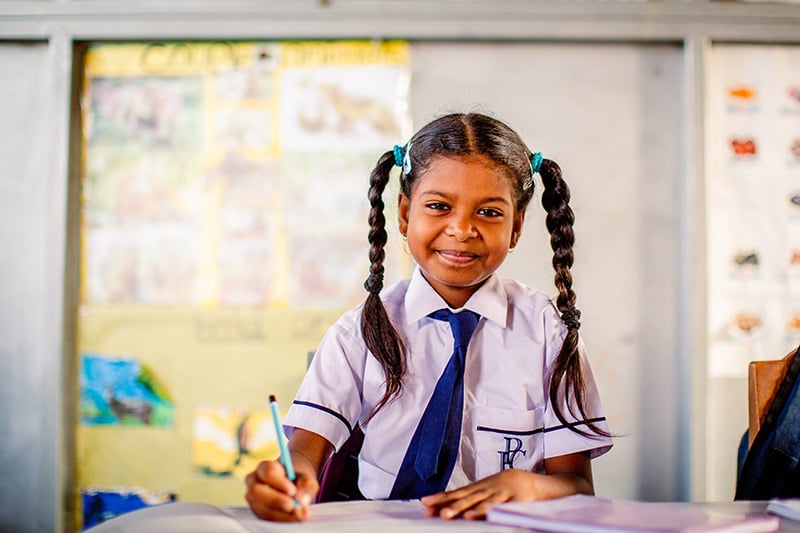World Vision report reveals girls’ resilience amid global challenges ahead of International Day of the Girl
Media Contact :
October 9, 2025
Public Relations Manager
[email protected]
m 253-298-8913
Media Contact :
October 9, 2025
Public Relations Manager
[email protected]
m 253-298-8913

WASHINGTON, D.C. (October 8, 2025) – Ahead of International Day of the Girl, a new report from Christian humanitarian organization World Vision highlights the hopes, struggles, and resilience of adolescent girls around the world. The report shows a generation ready to lead and make a difference — even as poverty, violence, harmful social role expectations, and conflict put too many of their dreams at risk.
The report, Dreaming Out Loud: Hopes and challenges facing girls around the world, surveyed over 400 girls across 51 countries. The findings illustrate how fragile progress towards equality for girls remains.
In Niger, 16-year-old Hassana feared her parents might marry her off if she failed an exam. In Bolivia, 14-year-old Alejandra worried that rising prices would keep her out of school. In the Democratic Republic of the Congo (DRC), some girls saw their gender as a protection against forced recruitment into armed groups yet feared sexual violence while carrying out daily tasks.
“Around the world, girls face barriers that threaten their education, safety, and future,” said Margaret Schuler, World Vision’s senior vice president of international programs. “When girls are excluded from school and opportunities, the consequences are profound — they are more likely to face violence and be held back from reaching their full potential. We have seen it time after time: investing in girls’ education, protection, and leadership is one of the most effective ways to break cycles of poverty and violence, helping entire communities thrive.”
Education was a common theme among those surveyed: 70% spoke about school, and one in three girls expressed fear that their education could be cut short due to poverty, child marriage, or conflict.
In South Sudan, 16-year-old Viola explained, “If you are a girl and they have not taken you to school, your father can force you to marry someone who has more cows.” In her community, bride price traditions — where daughters are exchanged for cattle or money — create a direct incentive to withdraw girls from school. These responses highlight how deeply girls worry about their education being cut short.
Despite these challenges, the report also offers encouraging insights. More than two-thirds (71%) of girls expressed confidence in their potential as leaders, challenging social norms and calling for greater representation. Many girls noted that attitudes are slowly changing. Education, exposure to positive role models, and community support are powerful drivers of progress.
Child Marriage
World Vision believes that every child deserves a hopeful future free of abuse, violence, child marriage, and other harmful practices. Yet, the reality is harsh: 51% of girls in Bangladesh and 23% of girls in Kenya are married before their 18th birthday.
World Vision is committed to ending child marriage. The organization’s Big Dream to End Child Marriage Program aims to help end child marriage everywhere we work in Kenya and parts of Bangladesh by 2030, tackling the root causes—poverty, harmful cultural norms, lack of education—through proven, community-driven solutions that protect girls and transform futures.
World Vision’s approach to ending child marriage includes five pillars: behavior change, education access, economic empowerment, reduction of water- and sanitation-related barriers to girls’ education and strengthening child protection systems. World Vision also works with faith, community, and government leaders to help shift beliefs and practices in those communities that cause harm to women and girls.
Child Sponsorship
World Vision’s child sponsorship program is a powerful tool in empowering girls to create brighter futures and realize their God-given potential. When a girl is sponsored, for example, she and her community are given sustainable access to nutritious food, clean water, healthcare and education.
During a recent trip to Kenya, Schuler witnessed the power of World Vision sponsorship and the Big Dream to End Child Marriage programs.
“In Kenya, World Vision’s sponsorship programs are transforming communities and unlocking opportunity for girls—equipping them and their families for long-term resilience,” she said.
“Through initiatives like Savings for Transformation groups, women invest in income-generating activities, build financial literacy, and become role models for the next generation. When girls see women leading businesses, sending their daughters to school, and breaking cycles of poverty, they begin to envision a different future—one free from child marriage and full of possibility.”
In the lead-up to International Day of the Girl, World Vision’s 1,000 Girls Campaign met its initial goal of 1,000 new child sponsorships for girls—and has now set a new target of 2,000 sponsorships by October 11, 2025.
“Sponsoring a girl isn’t just an act of kindness,” Schuler said. “It’s a powerful and pragmatic way to help her rewrite her future.”
Report available to download here: https://www.wvi.org/publication/child-sponsorship/1000Girls/dreaming-out-loud
About the Report
Dreaming out loud: Hopes and challenges facing girls around the world surveyed 432 adolescent girls across 51 countries between March and August 2025. Through interviews, video diaries and surveys, the study explored girls’ hopes, fears, and lived realities, supported by UN and World Bank data. While not nationally representative, the report offers a unique snapshot into the experiences and aspirations of girls living in diverse contexts — from conflict zones to high-income countries.
About World Vision:
World Vision is a Christian humanitarian organization dedicated to working with children, families and their communities worldwide to reach their full potential by tackling the causes of poverty and injustice. Motivated by our faith in Jesus Christ, we serve alongside the poor and oppressed as a demonstration of God’s unconditional love for all people. World Vision serves all people, regardless of religion, race, ethnicity or gender. For more information, visit worldvision.org or follow on X @WorldVisionUSA.